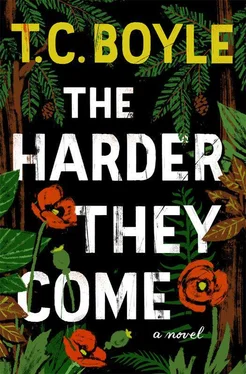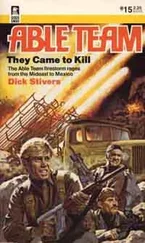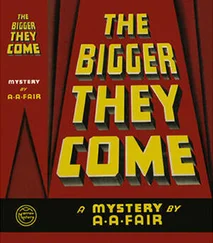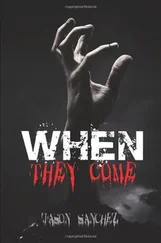“He’s not in his right mind, Rob. He’s not responsible. We’ve tried to get help for him, like that time at the Chinese consulate—”
But the sheriff wasn’t paying any attention because mental states weren’t the issue here. Murder was. Murder and felony drug violations. He went on, reading now: “‘As the victim and Mr. Moody made their way upslope in a light misting rain, they were unaware that the suspect was armed, concealed and lying in wait. It was their assumption that the operation had been abandoned, as it was late in the season and they saw no signs that anyone was in attendance. At some point, no more than ten minutes after they’d arrived, the suspect sprang from cover in a threatening manner and when the victim recognized him — called out his name, Adam —the suspect opened fire with his Chinese-made assault rifle, fatally wounding the victim, and then firing on Mr. Moody, who took cover and returned fire with a legally registered handgun he routinely carried for protection in the woods.
“‘The suspect subsequently retreated but began a flanking maneuver that caught Mr. Moody by surprise (he was at this juncture in full flight, in a heavily wooded area some two miles north of the river and the California Western Railroad tracks, or Skunk Railroad, as it is popularly known). Suddenly he came under fire again, and initially, using the trees for cover and returning fire to keep the suspect at bay, he couldn’t determine from which direction the fire was coming. When he realized that the shooter was now in front of him, cutting off his retreat, he began evasive maneuvers, heading west in deep forest before again turning south, where he finally reached the railway tracks at mile marker six and was able to flag down the operator of a railway utility vehicle known as a speeder cart, who took him to safety where he subsequently placed a 911 call.’”
The sheriff glanced up, held him with his eyes, then slapped the report down on the table. “Just so you understand, Sten, Adam actively hunted this guy down, and if Moody wasn’t armed and hadn’t used his head, we’d be talking about three deaths here.”
“He didn’t kill Carey. That was the Mexicans. I saw them. We both saw them out there in their pickup — Carey even called 911 to report them.” A glance at the deputy — and he was smirking. Or gloating. One or the other, take your pick. “What are you smirking about, you son of a bitch?”
And now the kid came to attention, all right, one hand instinctively going to his duty belt. “Who you calling a son of a bitch?”
“You. I’m calling you a son of a bitch.”
“Back off, Jason.” Rob straightened up with a sigh, put his hands on his hips. “In fact, why don’t you go out to the car for me and I’ll call you when I need you?”
There was a moment of hesitation, the deputy’s face a field for the interplay of his emotions, and then they both watched as he turned his back on them and picked his way across the lawn to flip the latch on the gate and disappear round the corner of the house.
“Sten. Look. I know this is hard,” Rob said, easing off the glasses and folding them away in his pocket. “But the evidence doesn’t support that.”
It was hard and it just got harder because he was trying to put Adam and Carey in the same equation, trying to picture the way his son would break with reality but always seemed to be able to come back to it, to right himself. Until now.
“I’ve got to ask you,” Rob said, no trace of understanding or even consideration left in his voice, just calculation, “—you know where he is?”
Sten just shook his head.
“When did you last see him?”
“I don’t know. It’s been a while.”
More gulls. The mountains. The ocean. Big River. And the sheriff, the sheriff calculating, because he was working on his own equation. “He was angry last time you saw him, isn’t that right? He didn’t want to leave that house. You had a fight, the two of you.”
“That’s right. But you’ve got to realize, Adam’s not normal. He needs help. I’ve been on to social services about it, everybody, and all I get is privacy laws, all I get is it’s none of my business.”
“And when he left that night, he went where?”
He was trying to come up with an answer, trying to mitigate, minimize, deny, but all he could do, even as Carolee came slamming through the back door with her hair in her face and her feet trying to run out from under her, was look toward the mountains. And point.
THIS TIME HE DIDN’T wait for the reporters and the fluffed-up anchorwomen or the rest of the hyenas either. The minute the sheriff left he went in and disconnected the phone and then took his cell out of his right-front pocket and buried it in the top drawer of the bureau in the bedroom. And when Carolee’s cell started ringing midway through dinner — a salad of cold chicken and avocado she’d numbly prepared at the kitchen counter with rigid hands and frozen arms, a salad neither of them could eat because food was the last thing they wanted — he got up from the table, dug the phone out of her purse and turned it off without bothering to find out who was calling or why. “What if it’s news?” she said. “What if they—?” But they both knew it wasn’t news and that they — the authorities, the cops, the SWAT teams Rob had already called in — hadn’t found or done anything. He just shook his head. Her phone was like a bomb, like an IED, and it could go off any minute and bring the whole house down. Didn’t she realize that? It was wrong. It was foul. It was dirty. So what he did was take it across the kitchen, down the hall and into the bedroom, where he buried it in the bureau right next to his own.
Neither of them slept that night. Every time he began to doze off he was aware of her there beside him, tense and alert, listening for sounds in the night. And he was listening too. Listening not for gunfire or the crackle of police radios or the rattling pulse of helicopters sweeping overhead, but for the furtive creaking of the back door, the sigh of bedsprings in the guest room, for Adam, come home to them. Because if he didn’t come home, didn’t get out of the way of everybody, didn’t get treatment and meds and whatever else it was going to take — court-appointed shrinks, the lockup — there was only one way this was going to turn out. Adam might have known these hills, might have been a mountain man — or boy, because that was what he was, a boy still and always — but the sheriff had cordoned off the whole area on both sides of Route 20 and banned entry to anyone for any purpose. They were carrying live ammunition out there. They had dogs. They had heat sensors. If he didn’t come in — and here was a prayer, sent up to whoever might be listening — he was dead.
Then it was morning. Mist in the yard. Carolee asleep finally, mercifully, and the whole world asleep with her. He was in the kitchen making coffee and distractedly gazing out the window when he saw something moving on the periphery of the yard and his heart jumped. Adam, he was thinking, beyond all reason — what were the chances, since he wouldn’t even return to the old house, the house he’d trashed, let alone this one? — and in the next moment he was out the door, barefoot and dressed only in the boxers and T-shirt he’d slept in. The grass was cold and wet but he didn’t feel it, didn’t feel anything — not until the image of his son vanished and rematerialized as some clown in oversized shorts and high-tops with a video camera on one shoulder and a microphone in his hand. “Mr. Stensen,” he was saying, and he didn’t ask if he could have a word because he already knew the answer and just plunged right in, “how do you feel about your son being the target of the biggest manhunt this community has ever seen?”
Читать дальше












